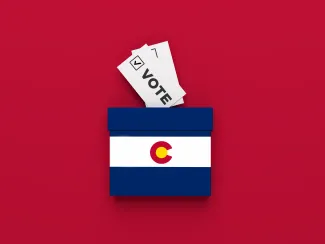
Colorado voters approve boost to free school meals program
Two ballot measures to fund Colorado’s universal school meals program, the only statewide contests in the 2025 off-year election, led in early results Tuesday night.
With more than 1.1 million votes counted as of just after 8 p.m., 63 percent of voters had cast a ballot in favor of Proposition LL, and 57 percent voted in favor of Proposition MM. Both measures were referred to the ballot by the Colorado General Assembly earlier this year.
Together, the measures will shore up funding for Healthy School Meals For All, a state program that provides free breakfast and lunch to all students regardless of their family’s income level.

© Baris-Ozer - iStock-1420488382
Colorado voters approved a ballot measure to create the program three years ago. It was funded by limiting income tax deductions for filers earning over $300,000 per year. The program’s funding mechanism raised more than expected in the 2023-2024 fiscal year, but its costs also exceeded projections, resulting in a budget gap that rose to roughly $50 million this year.
Proposition LL would allow the state to keep the $12.4 million in excess 2023-2024 revenue that would otherwise be returned to voters under the 1992 state constitutional amendment known as the Taxpayer’s Bill of Rights.
Proposition MM aims to permanently fund the full program by further limiting tax deductions for filers earning over $300,000 a year, raising an additional $95 million annually. Households in that high-income category would pay an average of $486 more in income taxes yearly, according to nonpartisan state fiscal analysts.
Keep Kids Fed Colorado, an issue committee registered in support of Propositions LL and MM, reported $739,200 in contributions since June, mostly from the nonprofit Hunger Free Colorado. The measures were endorsed by a long list of organizations including Children’s Hospital Colorado, Great Education Colorado, Mi Familia Vota, Rocky Mountain Farmers Union and Save the Children Action Network. The measures did not draw an organized opposition campaign.
During a special legislative session in August, Colorado lawmakers tweaked Proposition MM to allow the additional revenue to be spent on broader efforts to reduce food insecurity, once the Healthy School Meals For All program’s costs are covered. That would help the state partially offset the impact — estimated at up to $170 million annually — of reduced funding and higher administrative costs for the Supplemental Nutrition Assistance Program, or SNAP, as a result of cuts passed by congressional Republicans in July.

















